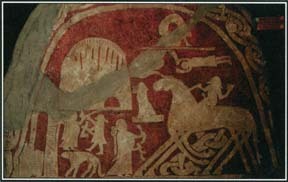Odin
Odin was the ruler of the Aesir, a group of deities in Norse* mythology. Sometimes called Allfather, Odin played a central role in myths about the creation and destruction of the world. He was the god of battle and also of wisdom, magic, and poetry. His name means "fury" or "frenzy," the quality of fierce inspiration that guided warriors and poets alike. Odin probably originated in the myths of early Germanic peoples, who called him Wo3anaz. The name of the fourth day of the week, Wednesday, comes from Woden's-day, the god's Old English name. Odin was married to Frigg, the guardian of marriage.
Myths. Odin spanned the history of the Norse mythic world from its creation to its destruction. Before the world existed, he and his two younger brothers, Vili and Ve, killed the primal frost giant Ymir. They used Ymir's bones, blood, and flesh to form the universe. Odin arranged the heavens for the gods, the middle world for humans and dwarfs, and the underworld for the dead. He then created the first man and woman from an ash tree and an elm tree.
Among the deities said to have been Odin's children were Balder and Thor*. Odin—the favorite deity of princes, nobles, and warriors—came to be seen as the supreme Norse god, the one to whom the other deities turned for help and advice. He ruled them from his palace Valhalla* in the heavenly realm called Asgard. As the god of war, Odin watched over warriors who fell in battle. Valkyries* carried the fallen ones straight to Valhalla. There Odin feasted them and prepared them for Ragnarok, the final battle in which the gods and the world were doomed to perish.
deity god or goddess
primal earliest; existing before other things
divination act or practice of foretelling the future
Odin was credited with great wisdom, including knowledge of magic and divination. He had paid a high price for this gift, however, giving one of his eyes in exchange for a drink from the well of Mimir. The waters of this well, which seeped from among the roots of the World Tree Yggdrasill, contained great wisdom. Another myth says that Odin stabbed himself with his magical spear, called Gungnir, and hung from Yggdrasill for nine days and nights in a living death. This self-sacrifice gave him knowledge of the runes, the Norse symbols used for writing and fortune-telling. Yet although Odin was wise, he could also be sly and treacherous. It was not unusual, for example, for him to break his word or to turn people against each other to start conflicts.

Odin had the power to change his appearance, and this shape shifting played a part in the myth that explains Odin's connection with poetry The wisest being who ever lived was Kvasir, whom the gods had formed from their own saliva. Dwarfs killed Kvasir and mixed his blood with honey to form a potion that granted wisdom and the gift of poetry. A giant hid the potion in the middle of a mountain and set his daughter to guard it. Odin changed himself into a snake and slithered through a tiny hole in the mountain. Then taking the form of a handsome giant, he charmed the daughter into letting him drink the potion. Once Odin had swallowed it, he changed into an eagle and flew to Asgard, where he vomited the potion into three sacred vats. A few drops of the potion fell to the earth during his flight and became the inspiration of lesser human poets.
Another myth reveals Odin as both a treacherous figure and the enforcer of divine justice. He observed two young princes, Agnar and Geirrod. On Odin's advice, Geirrod sent Agnar out to sea in a boat and then reported that his brother had drowned. After Geirrod grew up and became king, he was tested when a man named Grimnir appeared in his court. Fearing that the man was a sorcerer, Geirrod had him tortured. However, the king's son showed pity on Grimnir and helped him. After predicting that Geirrod would kill himself with his own sword, Grimnir revealed that he was Odin. The king grabbed his sword to attack him but tripped and stabbed himself. Odin then set the kindly son on the throne.
Odin liked to wander the earth in the form of an old man wearing a blue cloak and a wide-brimmed hat that hid his one-eyed face. Often he was accompanied by wolves and ravens, flesh eaters that haunt battlefields. His ravens Hugin (Thought) and Munin (Memory) traveled around the world and the underworld each day, returning to tell their knowledge-loving master what they had seen. Odin occasionally rode an eight-legged horse named Sleipnir, who could travel at great speed through the air and across water.
sorcerer magician or wizard
cult group bound together by devotion to a particular person, belief, or god
patron special guardian, protector, or supporter
ritual ceremony that follows a set pattern
Worship. The cult of Odin flourished across much of northern Europe and gained strength in the A . D . 700S and 800s, the age of the Vikings. These Norse warriors and raiders, especially the fearsome fighters called the Berserks, regarded Odin as their special patron. Their ceremonies in his honor included human sacrifice. Some victims died by the spear or by fire. However, ritual hangings were especially important in the worship of Odin, who was sometimes called the Lord of the Gallows or the Hanging God
* See Names and Places at the end of this volume for further information.
because of his own mythic hanging on the tree Yggdrasill. When the Vikings raided Nantes, a town in northwestern France, in 842, they hanged many of the inhabitants, perhaps as an offering to Odin.
See also Berserks ; Frigg ; Mimir ; Norse Mythology ; Ragnarok ; Thor ; Valhalla ; Yggdrasill ; Ymir .